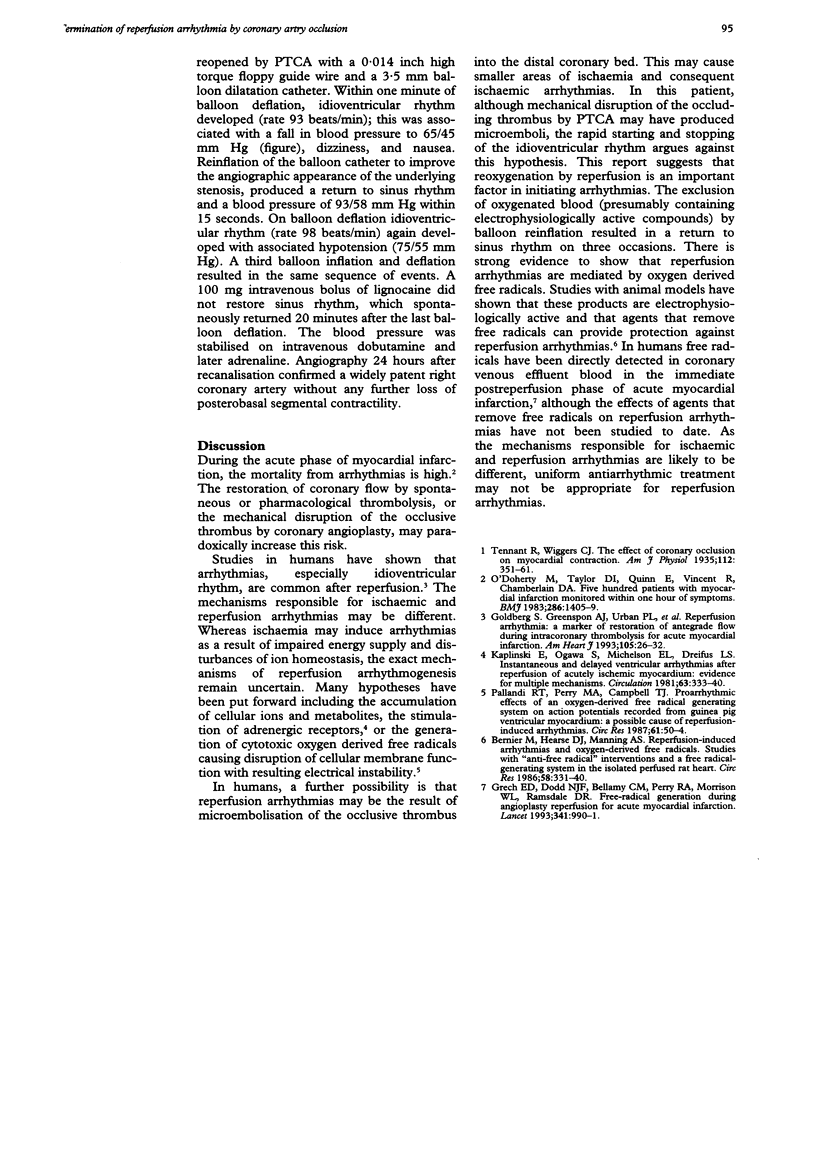Abstract
Reperfusion arrhythmias may be a cause of sudden death in acute myocardial infarction. A patient underwent successful coronary artery recanalisation by primary percutaneous transluminal coronary angioplasty (PTCA) for acute myocardial infarction. In this patient an idioventricular rhythm with a severe haemodynamic effect developed within one minute of deflation of the PTCA balloon. Sinus rhythm was immediately restored by reinflating the balloon and thus reinterrupting the supply of oxygenated blood. This suggests that reperfusion with consequent reoxygenation is a primary factor in arrhythmogenesis.
Full text
PDF

Selected References
These references are in PubMed. This may not be the complete list of references from this article.
- Bernier M., Hearse D. J., Manning A. S. Reperfusion-induced arrhythmias and oxygen-derived free radicals. Studies with "anti-free radical" interventions and a free radical-generating system in the isolated perfused rat heart. Circ Res. 1986 Mar;58(3):331–340. doi: 10.1161/01.res.58.3.331. [DOI] [PubMed] [Google Scholar]
- Goldberg S., Greenspon A. J., Urban P. L., Muza B., Berger B., Walinsky P., Maroko P. R. Reperfusion arrhythmia: a marker of restoration of antegrade flow during intracoronary thrombolysis for acute myocardial infarction. Am Heart J. 1983 Jan;105(1):26–32. doi: 10.1016/0002-8703(83)90274-0. [DOI] [PubMed] [Google Scholar]
- Grech E. D., Dodd N. J., Bellamy C. M., Perry R. A., Morrison W. L., Ramsdale D. R. Free-radical generation during angioplasty reperfusion for acute myocardial infarction. Lancet. 1993 Apr 17;341(8851):990–991. doi: 10.1016/0140-6736(93)91074-v. [DOI] [PubMed] [Google Scholar]
- Kaplinsky E., Ogawa S., Michelson E. L., Dreifus L. S. Instantaneous and delayed ventricular arrhythmias after reperfusion of acutely ischemic myocardium: evidence for multiple mechanisms. Circulation. 1981 Feb;63(2):333–340. doi: 10.1161/01.cir.63.2.333. [DOI] [PubMed] [Google Scholar]
- O'Doherty M., Tayler D. I., Quinn E., Vincent R., Chamberlain D. A. Five hundred patients with myocardial infarction monitored within one hour of symptoms. Br Med J (Clin Res Ed) 1983 Apr 30;286(6375):1405–1408. doi: 10.1136/bmj.286.6375.1405. [DOI] [PMC free article] [PubMed] [Google Scholar]
- Pallandi R. T., Perry M. A., Campbell T. J. Proarrhythmic effects of an oxygen-derived free radical generating system on action potentials recorded from guinea pig ventricular myocardium: a possible cause of reperfusion-induced arrhythmias. Circ Res. 1987 Jul;61(1):50–54. doi: 10.1161/01.res.61.1.50. [DOI] [PubMed] [Google Scholar]


